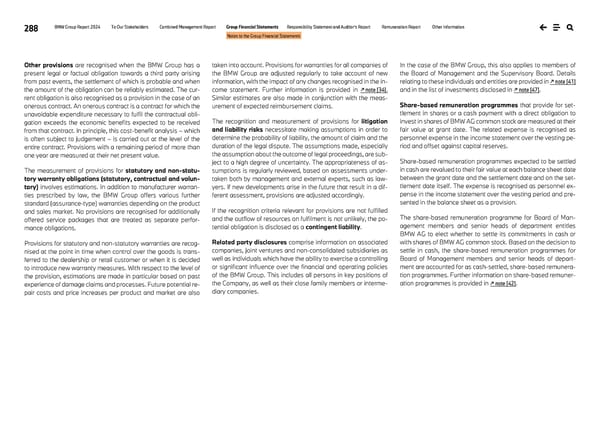288 BMW Group Report 2024 To Our Stakeholders Combined Management Report Group Financial Statements Responsibility Statement and Auditor’s Report Remuneration Report Other Information Notes to the Group Financial Statements Other provisions are recognised when the BMW Group has a present legal or factual obligation towards a third party arising from past events, the settlement of which is probable and when the amount of the obligation can be reliably estimated. The cur- rent obligation is also recognised as a provision in the case of an onerous contract. An onerous contract is a contract for which the unavoidable expenditure necessary to fulfil the contractual obli- gation exceeds the economic benefits expected to be received from that contract. In principle, this cost-benefit analysis – which is often subject to judgement – is carried out at the level of the entire contract. Provisions with a remaining period of more than one year are measured at their net present value. The measurement of provisions for statutory and non-statu- tory warranty obligations (statutory, contractual and volun- tary) involves estimations. In addition to manufacturer warran- ties prescribed by law, the BMW Group offers various further standard (assurance-type) warranties depending on the product and sales market. No provisions are recognised for additionally offered service packages that are treated as separate perfor- mance obligations. Provisions for statutory and non-statutory warranties are recog- nised at the point in time when control over the goods is trans- ferred to the dealership or retail customer or when it is decided to introduce new warranty measures. With respect to the level of the provision, estimations are made in particular based on past experience of damage claims and processes. Future potential re- pair costs and price increases per product and market are also taken into account. Provisions for warranties for all companies of the BMW Group are adjusted regularly to take account of new information, with the impact of any changes recognised in the in- come statement. Further information is provided in ↗ note [34]. Similar estimates are also made in conjunction with the meas- urement of expected reimbursement claims. The recognition and measurement of provisions for litigation and liability risks necessitate making assumptions in order to determine the probability of liability, the amount of claim and the duration of the legal dispute. The assumptions made, especially the assumption about the outcome of legal proceedings, are sub- ject to a high degree of uncertainty. The appropriateness of as- sumptions is regularly reviewed, based on assessments under- taken both by management and external experts, such as law- yers. If new developments arise in the future that result in a dif- ferent assessment, provisions are adjusted accordingly. If the recognition criteria relevant for provisions are not fulfilled and the outflow of resources on fulfilment is not unlikely, the po- tential obligation is disclosed as a contingent liability. Related party disclosures comprise information on associated companies, joint ventures and non-consolidated subsidiaries as well as individuals which have the ability to exercise a controlling or significant influence over the financial and operating policies of the BMW Group. This includes all persons in key positions of the Company, as well as their close family members or interme- diary companies. In the case of the BMW Group, this also applies to members of the Board of Management and the Supervisory Board. Details relating to these individuals and entities are provided in ↗ note [41] and in the list of investments disclosed in ↗ note [47]. Share-based remuneration programmes that provide for set- tlement in shares or a cash payment with a direct obligation to invest in shares of BMW AG common stock are measured at their fair value at grant date. The related expense is recognised as personnel expense in the income statement over the vesting pe- riod and offset against capital reserves. Share-based remuneration programmes expected to be settled in cash are revalued to their fair value at each balance sheet date between the grant date and the settlement date and on the set- tlement date itself. The expense is recognised as personnel ex- pense in the income statement over the vesting period and pre- sented in the balance sheet as a provision. The share-based remuneration programme for Board of Man- agement members and senior heads of department entitles BMW AG to elect whether to settle its commitments in cash or with shares of BMW AG common stock. Based on the decision to settle in cash, the share-based remuneration programmes for Board of Management members and senior heads of depart- ment are accounted for as cash-settled, share-based remunera- tion programmes. Further information on share-based remuner- ation programmes is provided in ↗ note [42].
 BMW Group Report 2024 Page 287 Page 289
BMW Group Report 2024 Page 287 Page 289